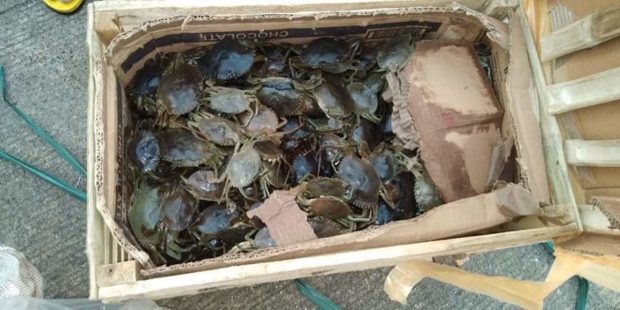
(File photo) Personnel from the Bureau of Fisheries and Aquatic Resources in Bicol intercepted on Feb. 11 at a checkpoint in Sorsogon City a van that contained illegally harvested shellfishes and crablets from the waters off Sorsogon province. PHOTO CONTRIBUTED BY BFAR BICOL
MANILA, Philippines—Sorsogon king crab fishers from the Save Gubat Bay Movement (SGBM) want to talk to the Bureau of Fisheries and Aquatic Resources (BFAR) about a 2020 administrative order regulating the fishing of mangrove crabs.
“Nais naming makuha ang paninindigan ng BFAR sa usapin na idudulog namin sa kanila. Malaki ang tungkulin ng nasabing ahensya para matiyak ang kabuhayan ng mga maliliit na mangingisda at mag-aalimango sa aming probinsya,” wrote the fishers alliance on Tuesday.
(We want the BFAR’s guarantee that it will hear our discussion. This agency plays a large role in securing the livelihoods of small fishers and crab raisers in our province.)
Issued on January 22, 2020, Fisheries Administrative Order (FAO) 264 prohibits the catching, possession, transporting, selling, and trading of live mangrove crablets with a carapace width (CW) of less than 12 centimeters from the wild.
In an official letter addressed to BFAR Director Demosthenes Escoto, the fishers alliance contested the prohibition, asserting that the bureau did not conduct thorough consultations with affected sectors before it inked FAO 264.
“Hindi kami sumasang-ayon sa FAO 264 na ipinagbabawal ang panghuhuli ng semilya (fingerling) ng mga alimango para diumano mapreserba ang mga ito. Hindi rin dumaan sa masusing konsultasyon sa mga apektadong sektor bago ipataw ang nasabing kautusan,” wrote the SGBM.
(We do not agree with the FAO 264 that prohibits the catching of fingerling crabs that would supposedly preserve them. Thorough consultations with affected sectors were also not conducted before the order was imposed.)
SGBM maintains that— because crab fishing as a primary livelihood has been passed down to them through generations— their current methods are sustainable and do not endanger mangrove crablets.
“Sa katunayan ay aktibo ang aming organisasyon sa pangangalaga ng mga bakawan at baybayin na nagsisilbing itlugan at tahanan ng mga alimango,” wrote the alliance in the letter.
(In reality, our organization is active in caring for the mangroves and beaches that serve as egg-laying areas and homes for the crabs.)
“Mariin din ang aming pagtutol sa mga aktibidad at proyekto na banta sa ekosistema at tahanan ng mga alimango,” it added.
(We also strongly oppose activities and projects that threaten the ecosystems and homes of these crabs.)
SGBM consists of three fisherfolk cooperatives: Cota na Daco Crablet Workers Association, Samahang Alay sa Kalikasan Cooperative, and the Sorsogon King Crab Raisers Association.
Inquirer has requested a response from BFAR regarding the request for dialogue, but has yet to answer as of posting.
RELATED STORIES:
Bataan fishers say sunken dredger threatens their livelihood
$209-M fisheries, coastal project starts in August